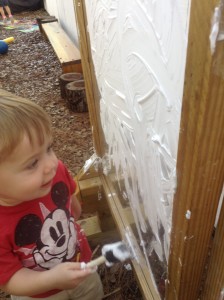 Our Curriculum
Our Curriculum
Our curriculum is inspired by the Reggio Emilia approach. It is an emergent curriculum combined with a meaningful Judaic component to form a comprehensive and developmentally appropriate program. It is designed to promote each child’s intellectual, social, physical, and emotional growth. Games and activities are developmentaly appropriate, skill-based, and intentional so that the children are growing with everything that they do.
Intellectual:
We encourage the children to develop self-motivation, active investigational skills through questioning, exploring, and observing, and the thinking and problem-solving abilities needed to thrive in a world of challenge and competition. Children are surrounded with books, literacy experiences, and exposure to the alphabet to prepare them for pre-reading and the reading that follows.
Social:
We encourage each child to work and play with others, to develop language communication skills, to respect the rights and privacy of their peers and most of all to develop feelings of kindness,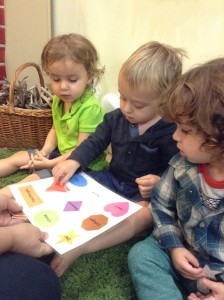 courtesy, helpfulness and acceptance.
courtesy, helpfulness and acceptance.
The ability to work alone and with other in a positive way is extremely important. Children get to practice these skills daily as they play and work together and alone. Adults facilitate child interactions and model appropriate words and actions to use with friends, to join a group, to resolve conflict, and to independently problem solve.
Emotional:
Children are encouraged to develop a positive self-concept, to understand the difference between right and wrong and to develop responsibility.We help them learn and practice appropriate ways to respond to others and to express their feelings constructively.
Physical:
Children are provided constant opportunities to develop their small and large muscle skills, to develop finger strength and dexterity, and arm-eye and body coordination.
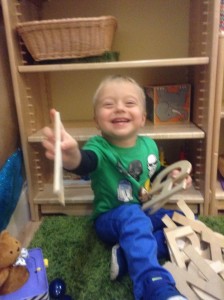 Fine motor Skills:
Fine motor Skills:
Manipulating materials such as clay, dough, sand, blocks, scissors, writing instruments and small manipulative games develops their fine motor skills.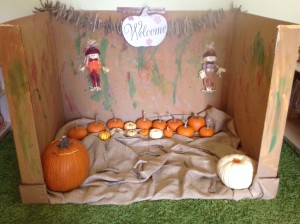
Gross Motor Skills:
Gross motor skills like coordination, balance, and cross-body movements are developed through a wide range of activities. Outdoor play is a daily part of the program, where children can run, jump, climb, slide and kick balls.
Math Skills:
Many of the manipulatives that help develop fine motor skills, as previously mentioned, also teach math skills and concepts.
E.g. building blocks of various sorts automatically offer lessons in balance, geometry, measurement and estimation. Children are encouraged to count objects. This gives them a better concept of what numbers mean. Grouping, sorting, graphing, and matching are some other activities that are often taking place as the children play in class.
Language Arts:
Surrounding children with a language-rich environment develops strong reading and language skills. Through the teachers modeling and encouraging the children to talk, listen, and even to write – at every opportunity – what they’re observing or doing as they work and play. Books are an important and constant part of the curriculum and are available to the children at all times. Children are also given access to writing materials and art utensils and are encouraged to experiment with them.
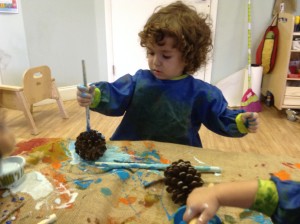 Science & Nature:
Science & Nature:
A child’s life is full of real things to observe discover and experience. They then have opportunities to make predictions, see cause and effects, and be actively involved in science experiments. Outside children find worms, bugs, plants, flowers and ice. Each of these discoveries becomes its own miniature science project. The children will plant and tend our very own organic garden. They will be able to see and taste the fruits of their labor as their seeds grow and blossom over the year.
Art & Drama:
Exploration and expression· two ways of accessing the inner self. Art is a perfect forum to accomplish this. Art is made available in a most aesthetically pleasing way. Art activities are designed to be open-ended and process-oriented rather than product-oriented. Children are offered different media and a large variety of tools with which they are encouraged to explore and experiment.
Children also have the chance to play different roles as they interact and play side by side with their peers. In the dramatic play area children choose to be moms, dads, babies and animals. In playing out these characters children gain socialization skills, and play out what they have seen modeled to them.
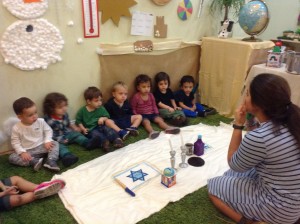 Music & Movement:
Music & Movement:
Music is an integral part of our program; through background music, songs that help us learn, rhythm to explore feelings, and interpretative dance, we explore our environment with music. Rhythms and repetitions are subsequently introduced through music, which are helpful for cognition. Instruments like drums, maracas, tambourines, xylophones and triangles are available in the classroom for exploration.
Integrating Tradition and Jewish Pride:
Lesson plans at DJP are built around the events influencing the children at the time that they are being taught. Weather changes, special animal habits, national celebrations and holiday seasons all determine what will be brought into the classroom at any particular time of year. All these are laced into the general curriculum to allow the children to learn from what is going on around them.
The children experience all the Jewish holidays through art, song, dramatic play, language, and literacy.
